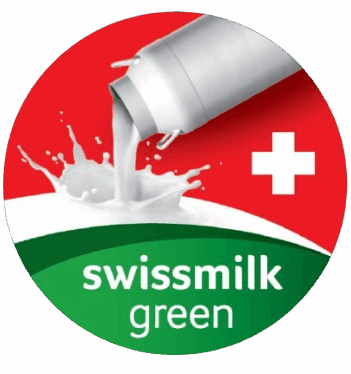It starts with our grass-fed difference
Our cows spend 97% of their time on pasture, more than anywhere else in the world, they make the most of natural sunlight and fresh air and have an average diet of 96% grass*.
Cows are the heart of our dairy farms, and their wellbeing means everything to our farmers. The high health and welfare standards of Switzerland cows means they live longer, productive lives. We have low use of antibiotics, and we have some of the world’s lowest somatic cell counts in the world. None of our cows are given hormones to produce extra milk.
Our cows graze on lush, green pastures, year round and have a diet of 96% grass*. Switzerlands remote location has helped protect and preserve our natural environment for thousands of years. With a temperate climate and an abundance of water and clean air, everything thrives here.

We believe we need to take action on climate
The Swiss Milk Climate Roadmap is our strategy towards our 2030 targets and ambition to be net zero by 2050. It maps out how our Co-operative will deliver key actions across farming, manufacturing, and supply operations. We have a clear plan in place to deliver the emissions reductions needed to play our part.

We have a natural advantage
Swiss Milk farmers use regenerative agriculture farming practices, supporting the resiliance of intergenerational farming businesses. These practices also have the potential to help us achieve our climate ambitions and support the future of the farming environments we depend on.
Swiss Milk farmers have been recording and submitting data about their farming operations for over a decade. Our data systems enable us to provide insights to help our farmer-owners improve their practices and climate impact. Our data also provides you with assurance about the practices and improvements that we’re making.
Grazed pastures have more organic matter and carbon content in the soil than cultivated fields. This means the soil has a better structure, increasing the amount of water and nutrients it can hold.
Ensuring our soil is healthy provides the best conditions for plant growth, encourages biological activity, stores water and resists erosion. It is essential for sustainable food production and nutrient management.
